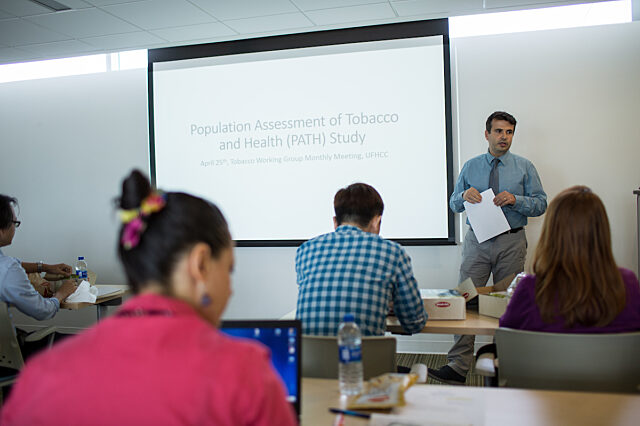The University of Florida AHEC Program presents Free Tools to Quit Classes. Participate in a program that more than doubles your chances of quitting…
Smoking cessation medications
Definition
Your health care provider can prescribe medicines to help you quit tobacco use. These medicines do not contain nicotine and are not habit-forming. They work in a different way than nicotine patches, gums, sprays, or lozenges.
Alternative Names
Smoking cessation - medications; Smokeless tobacco - medications; Medications for stopping tobacco
Information
Smoking cessation medicines can help:
- Lessen the craving for tobacco
- Decrease withdrawal symptoms
- Keep you from starting to use tobacco again
Like other treatments, these medicines work best when they are part of a program that includes:
- Making a clear decision to quit and setting a quit date
- Creating a plan to help you deal with smoking urges
- Getting support from a doctor, counselor, or support group
BUPROPION (Zyban)
Bupropion is a pill that may cut down your craving for tobacco.
Bupropion is also used for people with depression. It helps with quitting tobacco, even if you do not have problems with depression. It is not fully clear how bupropion helps with tobacco cravings and quitting tobacco.
Bupropion should not be used for people who:
- Are under age 18
- Are pregnant
- Have a history of medical problems such seizures, kidney failure, heavy alcohol use, eating disorders, bipolar or manic depressive illness, or a serious head injury
How to take it:
- Start bupropion 1 week before you plan to stop smoking. Your goal is to take it for 7 to 12 weeks. Talk with your doctor before taking it for a longer period of time. For some people, taking it longer helps prevent resuming smoking, and this is considered safe to do if needed.
- The most common dose is a 150 mg tablet once a day, going up to twice per day after 3 days with at least 8 hours between each dose. Swallow the pill whole. DO NOT chew, split, or crush it. Doing so can cause side effects, including seizures.
- If you need help with cravings when first quitting, you may take bupropion along with nicotine patches, gums, or lozenges. Ask your doctor if this is OK for you.
Side effects of this medicine may include:
- Dry mouth.
- Problems sleeping. Try taking the second dose in the afternoon if you have this problem (take it at least 8 hours after the first dose).
- Stop taking this medicine right away if you have changes in behavior. These include anger, agitation, depressed mood, thoughts of suicide, or attempted suicide.
VARENICLINE (CHANTIX)
Varenicline (Chantix) helps with the craving for nicotine and withdrawal symptoms. It works in the brain to reduce the physical effects of nicotine. This means that even if you start smoking again after quitting, you will not get as much pleasure from it when you are taking this drug.
How to take it:
- Start taking this medicine 1 week before you plan to quit cigarettes. Or, you can begin taking the medicine, then choose a date within 4 weeks to quit. Another way is to begin taking the medicine, then slowly stop smoking over the next 12 weeks.
- Take it after meals with a full glass of water.
- Your provider will tell you how to take this medicine. Most people take one 0.5 mg pill a day at first. By the end of the second week, you will likely be taking a 1 mg pill twice a day.
- DO NOT combine this drug with nicotine patches, gums, sprays or lozenges.
- Children under age 18 should not take this drug.
Most people tolerate varenicline well. Side effects are not common, but can include the following if they do occur:
- Headaches, problems sleeping, sleepiness, and strange dreams.
- Constipation, intestinal gas, nausea, and changes in taste.
- Depressed mood, thoughts of suicide and attempted suicide. Call your doctor right away if you have any of these symptoms.
NOTE: Use of this medicine is linked to an increased risk of heart attack and stroke.
OTHER MEDICINES
The following medicines may help when other treatments have not worked. The benefits are much less consistent, so they are considered second-line treatment.
- Clonidine is normally used to treat high blood pressure. It may help when it is started before quitting. This drug comes as a pill or patch.
- Nortriptyline is another antidepressant. It is started 10 to 28 days before quitting.
References
George TP. Nicotine and tobacco. In: Goldman L, Schafer AI, eds. Goldman-Cecil Medicine. 26th ed. Philadelphia, PA: Elsevier; 2020:chap 29.
Smokefree.gov website. Quit smoking. smokefree.gov/quit-smoking. Accessed June 7, 2021.
US Preventive Services Task Force website. Tobacco smoking cessation in adults, including pregnant persons: interventions. US Preventive Services Task Force recommendation statement. www.uspreventiveservicestaskforce.org/uspstf/recommendation/tobacco-use-in-adults-and-pregnant-women-counseling-and-interventions. Updated January 19, 2021. Accessed June 7, 2021.
US Food and Drug Administration website. Want to quit smoking? FDA-approved products can help. www.fda.gov/consumers/consumer-updates/want-quit-smoking-fda-approved-products-can-help. Updated December 12, 2017. Accessed June 7, 2021.
Related specialties
Our locations
Community and Patient Programs: Smoking cessation medications
Our community and patient programs provide great value to patients, families and loved ones. People can find support, educational materials, expert consultants and more. In most instances, these programs are offered free of charge.
-
Tobacco Free
For health and safety, all UF Health facilities and grounds are smoke free.
-
UF Smoking Cessation Programs
Free classes to help you quit smoking.
Calendar Events and Lectures: Smoking cessation medications
Gainesville, FL 32609
The University of Florida AHEC Program presents Free Tools to Quit Classes. Participate in a program that more than doubles your chances of quitting…
News and Patient Stories: Smoking cessation medications
UF Health researchers find medication most effective quitting method for cancer survivors who smoke
June 22, 2020
For years, evidence has shown the negative effects that smoking cigarettes has on cancer patients’ health outcomes, but sometimes quitting is easier said than…
College of Medicine, UF Health Cancer Center, +2 more

UF study find physicians, patients talking less about lung cancer screening
April 25, 2019
Smoking rates are down nationally, but so are discussions among physicians and smokers about lung cancer screening, University of Florida researchers have…
College of Public Health and Health Professions, UF Health Cancer Center, +2 more

